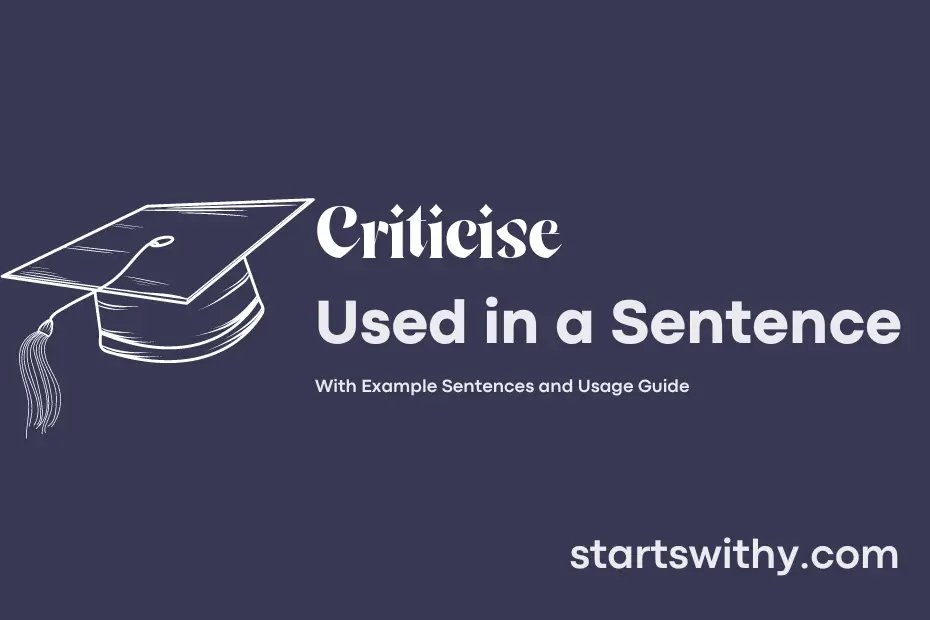Criticising is the act of evaluating and providing feedback or judgment on someone or something, pointing out both positive aspects and areas for improvement. Constructive criticism plays a crucial role in personal growth, professional development, and overall improvement in various facets of life.
While criticism can sometimes evoke negative emotions, it is an essential tool for learning and growth when delivered effectively and with good intentions. By offering constructive criticism, individuals can help others refine their skills, enhance performance, and make informed decisions. Ultimately, criticism, when given thoughtfully and respectfully, can be a powerful catalyst for progress and success.
7 Examples Of Criticise Used In a Sentence For Kids
- We should not criticise our friends when they make a mistake.
- It is not nice to criticise someone for their appearance.
- Instead of criticising, we can offer help and support.
- We should try our best not to criticise others.
- Everyone makes mistakes, so we should not criticise them for it.
- It is important to be kind and not criticise others.
- We can give constructive feedback instead of criticising others.
14 Sentences with Criticise Examples
- Criticise constructively, don’t just point out flaws.
- It’s important to criticise the government policies that affect our education system.
- Don’t be afraid to criticise a research paper if you find significant flaws in its methodology.
- Peer review is a vital part of academia where scholars criticise each other’s work.
- It’s okay to criticise your professor’s teaching methods if you feel they are not effective.
- As students, we should feel empowered to criticise outdated curriculum content.
- Criticise the lack of transparency in college administration to demand better governance.
- It’s essential to criticise discrimination and bias in campus culture to promote inclusivity.
- Let’s criticise the use of outdated technology in classrooms for a more interactive learning experience.
- Always be open to criticise your own work to grow and improve as a student.
- Students should criticise plagiarism and academic dishonesty to uphold integrity in academia.
- It’s crucial to criticise the funding allocation within universities to ensure proper resource distribution.
- You should criticise group members constructively without demotivating them during collaborative projects.
- Encourage students to criticise social injustice and take action for positive change in society.
How To Use Criticise in Sentences?
To use “Criticise” in a sentence, follow these simple steps:
-
Understand the Meaning: Before using the word “Criticise,” make sure you understand its meaning. Criticise means to express disapproval or point out faults or shortcomings in something.
-
Choose the right context: Pick a situation where you want to express your disapproval or point out flaws. This could be a movie, a book, a piece of art, a project, or someone’s behavior.
-
Structure your sentence: When using Criticise in a sentence, start by stating what you are criticizing, followed by your critique. For example, “I want to criticise the way the project was managed.”
-
Be tactful: Remember to be tactful and respectful when criticizing. Constructive criticism is meant to help improve a situation, not hurt feelings. Use polite language and offer suggestions for improvement if possible.
-
Practice makes perfect: The more you practice using Criticise in sentences, the more comfortable you will become with expressing your opinions effectively.
-
Review your sentence: Before sharing your criticism, reread your sentence to ensure it conveys your message clearly and respectfully.
In conclusion, using Criticise in a sentence involves understanding its meaning, choosing the right context, structuring your sentence properly, being tactful, practicing, and reviewing your sentence before sharing your critique. With these steps in mind, you can effectively express your disapproval or point out faults in a respectful manner.
Conclusion
In conclusion, the ability to construct meaningful sentences with the keyword “criticise” is important in expressing opinions and evaluations effectively. By critiquing a piece of work or behavior through such sentences, individuals can provide valuable feedback and insights for improvement. Constructing sentences with “criticise” allows for constructive criticism, fostering growth and development.
Moreover, mastering the art of crafting sentences with “criticise” enables individuals to communicate their disapproval or objections in a clear and respectful manner. It provides a platform for open dialogue and encourages thoughtful discussions. Ultimately, the skill of constructing sentences with “criticise” contributes to effective communication and the exchange of ideas in a constructive and productive manner.



